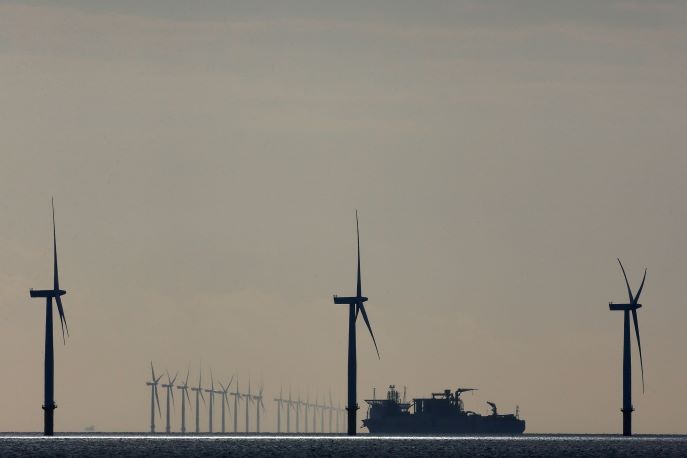James Alexander of UKSIF says the UK should replicate the success of offshore wind with the entire green economy
At COP26 last year in Glasgow, the UK Chancellor of the Exchequer, Rishi Sunak, pledged that the country would become the “world’s first net-zero financial centre”. As part of this, the chancellor outlined that the UK would introduce mandatory climate transition plans across the whole economy, requiring companies and financial institutions to produce robust, company-level plans setting out how they will decarbonise as the world transitions towards a low-carbon economy.
After becoming the first major economy to enshrine in law a net-zero target by 2050 and, earlier this year, introduce mandatory climate-related disclosures for the largest businesses, this announcement came as a hugely positive signal to those of us in the UK financial services sector.
The bold objective signalled the UK’s intention to continue to be a leader in addressing the climate change crisis, and lead the way in shifting our world-leading financial services sector towards a more sustainable future.
However, six months on and there remains a lack of guidance and necessary clarity from the UK government on how private financial flows will shift towards net-zero at the scale required to meet its objective. This mission has become increasingly pressing in light of new evidence showing we will very likely exceed a 1.5 degrees Celsius global warming threshold over the next five years.
The government needs to drive forward, at pace, binding decarbonisation pathways, and provide certainty over frameworks
Earlier this year, the UK Sustainable Investment and Finance Association (UKSIF), a membership organisation for sustainable finance, carried out a “net-zero inquiry” with our membership to identify how the UK’s financial sector can move towards aligning itself with net zero. More than 200 senior financial services’ representatives participated, reflecting increasing interest from investors and others to contribute to public policy
debates on climate change.
In a new report, we provide detailed recommendations for government, regulators and the industry itself, on how the UK can drive the systemic change necessary to move the financial system towards a net-zero future.

An Extinction Rebellion activist smashes a window at HSBC in Canary Wharf, London. (Credit: John Sibley/Reuters)
With the UK economy and global economies nowhere close to being aligned to a 1.5C or even 2C trajectory, the report identifies radical transformation of the real economy as an absolutely critical priority.
Government has yet to outline the detailed policy frameworks and incentives that will be required for various economic sectors – from heat and buildings to food and agriculture – to decarbonise. It needs to prioritise a sectoral approach, inspired by the success of the UK’s previous “offshore wind sector deal”, where consistent political support over the past 20 years fostered confidence to invest in research and development, supply chains and skills, so today the UK is second only to China in installed capacity. The government needs to drive forward, at pace, binding decarbonisation pathways, and provide certainty over future financing frameworks.
Carbon pricing will need to be part of the policy mix too. More broadly, a net-zero test should be applied across government’s decisions to ensure these are consistent with a net-zero pathway.
There is a clear leadership opportunity for the UK to take its own path on the ‘green taxonomy’
Globally, leading financial regulation should play its part to support the UK finance sector towards net-zero. There is a clear leadership opportunity for the UK to take its own path on the “green taxonomy”, a list which defines “green” economic activities. The UK’s taxonomy must be based purely on science, and we are extremely concerned by recent reports that the UK will follow the EU in including natural gas in the taxonomy, which we believe would seriously damage the UK’s leadership position on sustainable finance over the coming years.
Wider sustainability issues material to the long-term value of the economy, such as biodiversity and social issues, must also be urgently addressed. We would also like to see a roadmap from the government for the creation of a “social taxonomy” in the years ahead, building off its work on the existing green taxonomy.
Such a taxonomy, which would identify for investors and companies the social impact and performance of companies, would enhance the UK’s focus on addressing those pressing social challenges that are key to delivering net-zero success and what is known as a just transition.

A ship passes an offshore wind farm near in Clacton-on-Sea in eastern England. (Credit: Stefan Wermuth/Reuters)
We strongly believe that if we do not have a just transition, politically it will be impossible to deliver a transition at all, and this must be a key focus of government’s decision-making. A UK-wide Just Transition Commission could advise on this key task, for example working to identify those sectors where jobs are most at risk and propose the reskilling interventions that are needed.
Finally, as the demand for robust environmental, social and governance (ESG) data grows, the role played by ESG data providers will become more fundamental to the finance sector’s transition. That is why the time has come for this group to be formally brought within the Financial Conduct Authority’s regulatory remit.
Six months on from the UK’s hosting of COP26, now is an opportune moment to set out a comprehensive roadmap to creating the world’s very first net-zero financial centre. We will look to play our full part, alongside our members, policymakers, civil society and others to bring this about in the years ahead, and show the UK can once again lead the way in bringing about a more sustainable future.

James Alexander is chief executive of the UK Sustainable Investment and Finance Association (UKSIF). He is a member of the Green Technical Advisory Group, providing advice to the UK government on implementing a UK ‘green taxonomy’, and a member of the Disclosures and Labels Advisory Group (DLAG) providing advice to the FCA on the UK’s disclosures and fund labelling regime.
COP26 UKSIF Sustainable finance Net Zero Carbon Pricing green taxonomy

